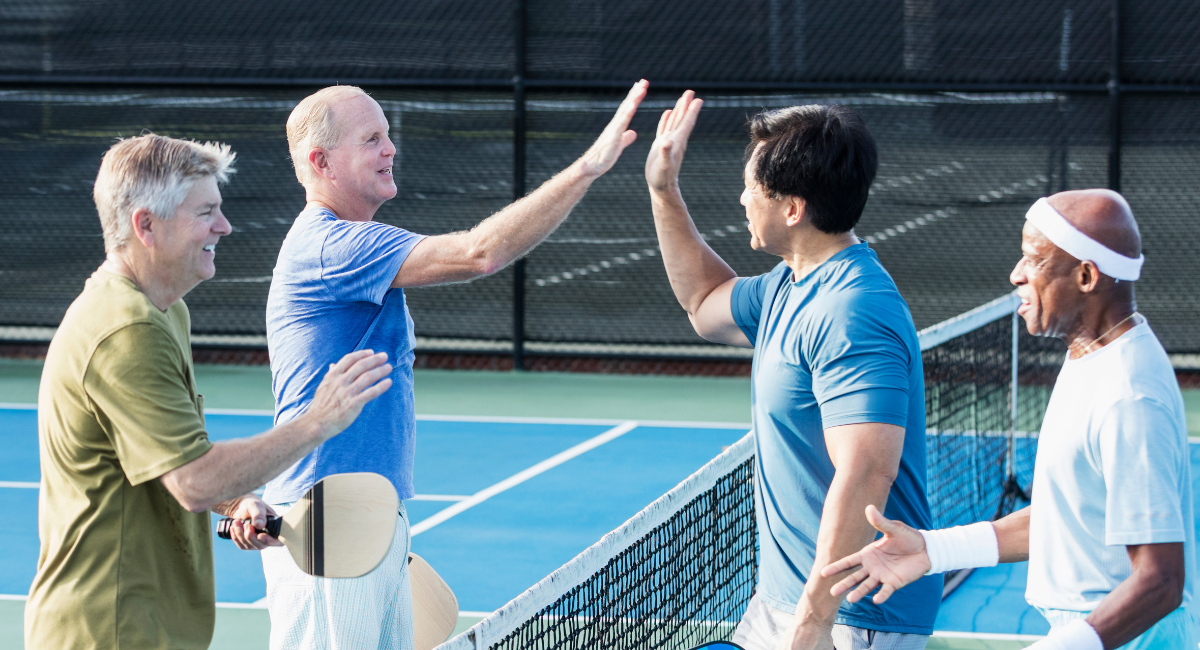
As spring temperatures rise, weekend warriors across the country eagerly return to baseball, pickleball, and other favorite seasonal sports. However, the enthusiasm to jump back into sports after winter can lead to common injuries if proper precautions aren’t taken. Whether you’re heading to the pickleball court or simply ready to brave the outdoors and start jogging again, Dr. Michael McCartney, a family and sports medicine expert in the Charlotte area, shares vital information about how to safely transition back into your favorite activities after a long winter.
Common injuries for weekend warriors
Dr. McCartney and his team see a variety of injuries when leisure athletes return to sports too quickly after a hiatus. However, the type of injury depends on the activity they’re returning to.
- For people returning to playing baseball or softball, common issues include shoulder strains and inner elbow injuries.
- For those returning to their beloved pickleball courts, injuries often manifest as tennis elbow and rotator cuff problems, particularly among those who haven’t maintained conditioning during winter months.
- For runners who suddenly pick up their pace and distance when the weather gets nice, they might experience shin splints, Achilles tendinitis, runner’s knee, hamstring strains, muscle strains, and stress fractures.
Strategies for preventing injuries
Dr. McCartney says there are many ways to proactively prevent these injuries from occurring, though it depends again on the specific activity.
Baseball injury prevention
Those returning to baseball should focus on:
- Gradual progression in throwing distance and intensity
- Proper shoulder and elbow conditioning
- Regular stretching of throwing muscles
- Adequate rest between playing sessions
Pickleball injury prevention
To avoid common pickleball injuries, recreational athletes should:
- Build up arm and shoulder strength before intense play
- Practice proper stroke mechanics
- Take breaks between games
- Use appropriate equipment for skill level
General guidelines for all weekend warriors
For everyone returning to any type of athletic activity, Dr. McCartney recommends to:
- Hydrate consistently before, during, and after play – this should mostly be water, but can be an electrolyte beverage when you’re profusely sweating
- Get adequate sleep for recovery, aiming for consistent sleep and wake times
- Include rest or active recovery days
- Cross-train (do a different type of activity) to prevent overuse
- Build overall strength and flexibility
When weekend warriors should worry
While normal muscle soreness can be expected, certain symptoms require attention. Dr. McCartney explains that often, injuries share some common warning signs. He recommends paying close attention to the following warning signs and stopping or resting if you observe them.
Stop play immediately if you experience:
- Sudden, sharp pain during activity
- Joint swelling or limited mobility
- Decreased strength or range of motion
- Any head injury symptoms, including headaches, dizziness, blurred vision, memory lapses, or nausea and vomiting
- Chest pain or irregular heartbeat
Get urgent medical care if you experience:
- Concussion symptoms, including headaches, dizziness, blurred vision, memory lapses, or nausea and vomiting
- Cardiac symptoms during play, like chest pain or irregular heartbeat
- Symptoms persisting beyond 2-3 weeks
- Severe pain or mobility issues
- Joint swelling that becomes significant
General injury care:
For non-urgent injury care, Dr. McCartney recommends:
- Immediate rest from the activity
- Ice application for acute injuries
- Compression with appropriate bandaging
- Elevation when possible
- Over-the-counter pain relief as needed
Year-round fitness for weekend warriors
The best way to prevent injuries is to maintain fitness throughout the year.
“Even when outdoor sports aren’t possible, you should stay active,” advises Dr. McCartney. “Use indoor facilities, try alternative activities, or focus on conditioning. This helps prevent the deconditioning that leads to spring sports injuries.”
Remember, whether you’re dealing with injuries or not, listening to your body is crucial. Weekend warriors who take a measured approach to returning to activity typically enjoy a safer, more successful spring sports season.
General tips for the committed weekend warrior
To minimize the risk of injuries when returning to your sport, Dr. McCartney recommends to:
- Start with shorter playing sessions
- Focus on proper technique before intensity
- Build up endurance gradually
- Maintain flexibility with regular stretching
- Consider working with a trainer or coach initially
By following these guidelines, the risk of injuries can be minimized while maximizing the enjoyment of spring sports. Remember, a thoughtful return to activity helps ensure you’ll be able to continue playing throughout the season.
If you have additional questions about returning to sports safely or could use some expert guidance, make an appointment with your primary care clinician to learn more about how to make this the best spring season yet.

